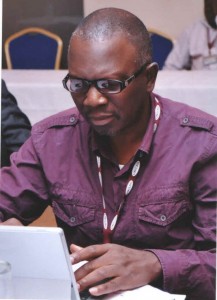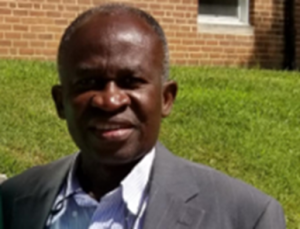OA Fakinlede, Oda, April 7, 2024
16 Then Jacob awoke from his sleep and said, “Surely the LORD is in this place, and I did not know it.” 17 And he was afraid and said, “How awesome is this place! This is none other than the house of God, and this is the gate of heaven.” ESV Genesis 28:16-17
“16 And Jacob awaked out of his sleep, and he said, Surely the LORD is in this place; and I knew it not. 17 And he was afraid, and said, How dreadful is this place! this is none other but the house of God, and this is the gate of heaven”. KJV Genesis 28:16-18
Jacob, having cheated his brother, was on the run for his life. Tired, he saw what he thought was an ordinary place by the wayside. Unlike us, he did not get a good pillow – he had to make do with a stone! But the night was eventful. He saw a mighty vision in the night. Angels of God were ascending and descending and he received a promise – not just of protection, but about mighty acts of God that transcended his immediate problems. By the time he woke up, he had a completely different perception of the extra-ordinariness of the place! “The Lord is in this place! And I did not know!”
11 And he came to a certain place and stayed there that night, because the sun had set. Taking one of the stones of the place, he put it under his head and lay down in that place to sleep. 12 And he dreamed, and behold, there was a ladder set up on the earth, and the top of it reached to heaven. And behold, the angels of God were ascending and descending on it! Genesis 28:11-12
When he knew of God’s presence, what was his opinion of the place? “Dreadful”! “Awesome”!
One baffling thing about the present religious climate in Nigeria is the “arifin” of God. In the new testament, simply falsifying the account of what they gave to God caused the death of Brother Annanias and Sister Sapphira! (Acts of the Apostles, chapter 5) The presence was awful, it was dreadful! It was not trivial! It was awesome!
The presence of the Lord with the travelling Israelites to the promised land was as mighty as it was awesome! It was a shade during the hot day sun, it was a defence and fire in the night. Awesome!
We cannot demand the presence of God! We are too unworthy to even ask! Imagine that I wish that the governor of Ondo State to have his presence with me when I am going to the market. Can I go and ask him to follow me? Maybe his assistants will think I was mad to even contemplate that! But it will be a different matter if Mr Aiyedatiwa, of his own accord, decided to follow me to the market! Jesus said “Where two or three are gathered in my name, I will be among them!” Matt 18:20. It was His idea, not ours. Otherwise, it would have been preposterous!
There are several issues to consider about our being in the presence of God. Two of these will be discussed today: Being in God’s presence worthily, and being conscious of it! Are we not most frequently like Jacob? The Lord was there, he was not aware.
He’s got his eyes on you
He’s got his eyes on you
My Lord, sitting in His kingdom,
He’s got his eyes on you!I will not be a liar, I tell you the reason why
Cause my Lord might call me,
And I wouldn’t be ready to die.
He’s got his eyes on you …”Hypocrite”, “Cheater”, etc.
Backtrack to the passages given by the reverend for this occasion. There are six of them. When I printed them out. They occupied four pages! If I were to simply read them, they would take the time! But I guess he wants me to do better than that. I will therefore base this message on only one of these passages.
“1 I will bless the Lord at all times
his praise shall continually be in my mouth.
2 My soul shall make her boast in the LORD:
the humble shall hear thereof, and be glad.
3 O magnify the LORD with me,
and let us exalt his name together.
4 I sought the LORD, and he heard me,
and delivered me from all my fears.
5 They looked unto him, and were lightened:
and their faces were not ashamed.
6 This poor man cried, and the LORD heard him,
and saved him out of all his troubles.
7 The angel of the LORD encampeth
round about them that fear him, and delivereth them.
8 O taste and see that the LORD is good:
blessed is the man that trusteth in him.
9 O fear the LORD, ye his saints:
for there is no want to them that fear him.
10 The young lions do lack, and suffer hunger:
but they that seek the LORD shall not want any good thing”. Psalms 34:1-10
First three verses here are our lead and watchword every communion service and Hymn 290: Through all the changing scenes of life
1. Through all the changing scenes of life
In trouble and in joy,
The praises of my God shall still
My heart and tongue employ.
2. Oh, magnify the Lord with me,
With me exalt His name;
When in distress to Him I called,
He to my rescue came.
3. The hosts of God encamp around
The dwellings of the just;
Deliverance He affords to all
Who on His succor trust.
4. Oh, make but trial of His love,
Experience will decide
How blest they are, and only they,
Who in His truth confide.
5. Fear Him, ye saints, and you will then
Have nothing else to fear;
Make you His service your delight,
Your wants shall be His care.
We shall conclude this morning message by focussing on verse 5. How many times does the word “fear” occur in the Bible? 437 times!
Did you know that God commanded us not to fear 366 times in the bible? There is a “Fear not for each day with a spare one for the leap year.
Did you also know that the reason God gave that we may not fear is NOT because bad things cannot happen to us? The quality of faith is not in the avoidance of evil. It is instead in the hierarchy of the evil. “iku ti o pa ni, t’o ba si ni ni fila, ka maa dupe”! Some things are worse than others!
In verse 5 the poet drew powerfully on that thought by telling us whom to fear after which we have nothing left to fear! Matthew 10:28. Fear hath torment (I Jn 4:18-20. Jesus came to destroy all the works of the devil. One of the works of the devil he came to destroy is to free those who through fear are made captive all their lives-Heb 2:15 “and deliver all those who through fear of death were subject to lifelong slavery.”
One “koko” of the matter of walking in the consciousness of the presence of God is in our not fearing not being afraid. The positive part is in being thankful: two sides of the same coin.
Do you forget the presence of God? You are like Jacob, and you come to know it intermittently? Do you fear for your life? Are you in bondage by the fear of death?
You are not alone! I fear like you also.
1. Come to the realization
2. Know that God has a cure
3. Thankfulness can help us practice the presence of God. It helps us know that God is near us, that He is with us.
4. We can grow. We do not have to go from bad to worse. We can be better. We can know God better. And feel him better. And be more obedient.
5. It is a choice to move in that direction; or the opposite!



